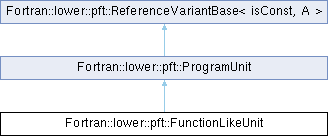#include <flang/Lower/PFTBuilder.h>

Public Types | |
| using | FunctionStatement |
| Public Types inherited from Fortran::lower::pft::ReferenceVariantBase< true, A... > | |
| using | BaseType |
| using | Ref |
Public Member Functions | |
| FunctionLikeUnit (const parser::MainProgram &f, const PftNode &parent, const Fortran::semantics::SemanticsContext &semanticsContext) | |
| FunctionLikeUnit (const parser::FunctionSubprogram &f, const PftNode &parent, const Fortran::semantics::SemanticsContext &semanticsContext) | |
| FunctionLikeUnit (const parser::SubroutineSubprogram &f, const PftNode &parent, const Fortran::semantics::SemanticsContext &semanticsContext) | |
| FunctionLikeUnit (const parser::SeparateModuleSubprogram &f, const PftNode &parent, const Fortran::semantics::SemanticsContext &semanticsContext) | |
| FunctionLikeUnit (FunctionLikeUnit &&)=default | |
| FunctionLikeUnit (const FunctionLikeUnit &)=delete | |
| bool | isMainProgram () const |
| parser::CharBlock | getStartingSourceLoc () const |
| Get the starting source location for this function like unit. | |
| void | setActiveEntry (int entryIndex) |
| const semantics::Symbol & | getSubprogramSymbol () const |
| const semantics::Symbol * | getMainProgramSymbol () const |
| Evaluation * | getEntryEval () const |
| void | setHostAssociatedSymbols (const llvm::SetVector< const semantics::Symbol * > &symbols) |
| HostAssociations & | parentHostAssoc () |
| bool | parentHasTupleHostAssoc () |
| bool | parentHasHostAssoc () |
| HostAssociations & | getHostAssoc () |
| const HostAssociations & | getHostAssoc () const |
| LLVM_DUMP_METHOD void | dump () const |
| const Fortran::semantics::Scope & | getScope () const |
| Get the function scope. | |
| Public Member Functions inherited from Fortran::lower::pft::ProgramUnit | |
| template<typename A> | |
| ProgramUnit (const A &p, const PftNode &parent) | |
| ProgramUnit (ProgramUnit &&)=default | |
| ProgramUnit (const ProgramUnit &)=delete | |
| Public Member Functions inherited from Fortran::lower::pft::ReferenceVariantBase< true, A... > | |
| ReferenceVariantBase (std::variant< Ref< A >... > b) | |
| ReferenceVariantBase (Ref< T > b) | |
| constexpr BaseType< B > & | get () const |
| constexpr BaseType< B > & | getStatement () const |
| constexpr BaseType< B > * | getIf () const |
| constexpr bool | isA () const |
| constexpr auto | visit (VISITOR &&visitor) const |
Public Attributes | |
| std::optional< FunctionStatement > | beginStmt |
| Anonymous programs do not have a begin statement. | |
| FunctionStatement | endStmt |
| const semantics::Scope * | scope |
| LabelEvalMap | labelEvaluationMap |
| SymbolLabelMap | assignSymbolLabelMap |
| ContainedUnitList | containedUnitList |
| EvaluationList | evaluationList |
| llvm::SmallVector< std::pair< const semantics::Symbol *, Evaluation * >, 1 > | entryPointList {std::pair{nullptr, nullptr}} |
| int | activeEntry = 0 |
| Current index into entryPointList. Index 0 is the primary entry point. | |
| const semantics::Symbol * | primaryResult {nullptr} |
| bool | hasIeeeAccess {false} |
| bool | mayModifyHaltingMode {false} |
| bool | mayModifyRoundingMode {false} |
| bool | mayModifyUnderflowMode {false} |
| mlir::Block * | finalBlock {} |
| Terminal basic block (if any) | |
| HostAssociations | hostAssociations |
| std::list< Fortran::semantics::PreservedUseStmt > | preservedUseStmts |
| Preserved USE statements for debug info generation. | |
| Public Attributes inherited from Fortran::lower::pft::ProgramUnit | |
| PftNode | parent |
Detailed Description
Function-like units may contain evaluations (executable statements), directives, and internal (nested) function-like units.
Member Typedef Documentation
◆ FunctionStatement
Member Function Documentation
◆ getEntryEval()
|
inline |
Return a pointer to the current entry point Evaluation. This is null for a primary entry point.
◆ getHostAssoc()
|
inline |
Return the host associations for this function like unit. The list of host associations are kept in the host procedure.
◆ getMainProgramSymbol()
|
inline |
Return a pointer to the main program symbol for named programs Return the null pointer for anonymous programs
◆ getSubprogramSymbol()
|
inline |
Return a reference to the subprogram symbol of this FunctionLikeUnit. This should not be called if the FunctionLikeUnit is the main program since anonymous main programs do not have a symbol.
◆ parentHasHostAssoc()
| bool Fortran::lower::pft::FunctionLikeUnit::parentHasHostAssoc | ( | ) |
Return true iff the parent is a procedure and the parent has a non-empty set of host associations for variables.
◆ parentHasTupleHostAssoc()
| bool Fortran::lower::pft::FunctionLikeUnit::parentHasTupleHostAssoc | ( | ) |
Return true iff the parent is a procedure and the parent has a non-empty set of host associations that are conveyed through an extra tuple argument.
◆ parentHostAssoc()
| Fortran::lower::HostAssociations & Fortran::lower::pft::FunctionLikeUnit::parentHostAssoc | ( | ) |
Return the host associations, if any, from the parent (host) procedure. Crashes if the parent is not a procedure.
Member Data Documentation
◆ entryPointList
| llvm::SmallVector<std::pair<const semantics::Symbol *, Evaluation *>, 1> Fortran::lower::pft::FunctionLikeUnit::entryPointList {std::pair{nullptr, nullptr}} |
<Symbol, Evaluation> pairs for each entry point. The pair at index 0 is the primary entry point; remaining pairs are alternate entry points. The primary entry point symbol is Null for an anonymous program. A named program symbol has MainProgramDetails. Other symbols have SubprogramDetails. Evaluations are filled in for alternate entries.
◆ primaryResult
| const semantics::Symbol* Fortran::lower::pft::FunctionLikeUnit::primaryResult {nullptr} |
Primary result for function subprograms with alternate entries. This is one of the largest result values, not necessarily the first one.
The documentation for this struct was generated from the following files:
- include/flang/Lower/PFTBuilder.h
- lib/Lower/PFTBuilder.cpp
Generated on for FLANG by